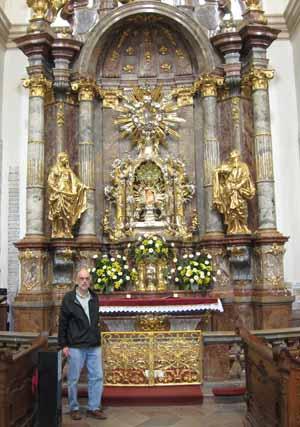
By Dan Ebener
On a recent trip to Croatia teaching a leadership course, I had the opportunity to connect with a religious pilgrimage to Prague, Czech Republic. This may seem like an unusual destination for a pilgrimage, so let me explain.
When I was 7 months old, I had a near-fatal illness resulting from spinal meningitis. Recently, I interviewed my parents and the doctor involved. Apparently, I was isolated in a sequestered room for about two and a half weeks at St. Mary’s Hospital in LaSalle, Ill. My mother stayed with me the whole time. I recently asked my mother what she did all that time she spent with me in that room. Not surprisingly, she prayed. Knowing my mother, I also had to ask what prayers, and she told me she prayed to the Infant of Prague. This came as a surprise. I asked her why and she said simply because I was an infant and because she knew that the Infant of Prague has been credited with many miracles.
The medical miracle of my survival from spinal meningitis is an interesting story of how God answers our prayers by working through other people. My mother’s prayers actually had a profound impact on Dr. George Lucas, our family doctor. My mother was filled with hope for a cure for her baby as she stayed with me day and night. The doctors were very pessimistic about the outcome. The difference between hope and optimism is important here. Optimism is looking at the data and expecting a positive outcome. Hope expects a positive outcome without considering the facts. No amount of expert information from the doctors could dissuade my mother’s hope. Interestingly, it was her hope that saved my life.
As my father tells the story, Dr. Lucas grew worried that my mother was going to be devastated when she would receive the inevitable news of my death. Because of this, my mother inspired Dr. Lucas to take a medical risk and try something he otherwise would not have tried. As Dr. Lucas tells the story, penicillin was new at that time and the medical uses were still exploratory. However, because of my mother, he was moved to talk to my father about using penicillin to treat my spinal meningitis, which we know now is the correct treatment.
The point of this story is that God works through people, and people work through relationships with each other, in the performance of miracles. My parents had a close personal relationship with Dr. Lucas. He was our family doctor and he delivered all 11 of my mother’s children. Dr. Lucas had a son Bob who would later become one of my classmates. The doctor’s compassion and his competence both played into the miracle. But it was his relationship with my parents that moved him to play his part in the miracle that saved my life.
The image of the Infant Jesus of Prague, which kept alive my mother’s hope during my illness, was the reason for my visit to Prague. I visited the small monastery where a modest shrine to the Infant attracts visitors from around the world. As I knelt to pray the rosary, tears of joy overcame me. I went to Mass with a group of Koreans, said the rosary for my parents and was even able to go to confession. Three hours later, I walked to an Internet café and called my folks to thank them for the gift of life they have given me.
A postscript to my story: The Infant of Prague initially challenged my image of Jesus as a poor child raised in Nazareth. The regal image of Jesus as a 3-year old was a contradiction for me. However, I have a much different attitude about the Infant after visiting Prague. It turns out that over the centuries, princes, kings and world leaders have sent multiple variations of the clothing that the Infant wears, each from their own cultural tradition. This has nurtured peaceful relationships among leaders around the world. The symbol of the Infant Jesus of Prague has inspired secular kings and leaders to defer to Jesus on their own royalty and to recognize Jesus as the true model for leadership.
The notion of Jesus as king has always been a difficult concept for me. It conjured up images of Jesus on a pedestal. In fact, pictures of Jesus as king using images of human royalty disgusted me. However, I have come to appreciate the paradox in everything about Jesus. In our own human clumsiness, it is not surprising that we have a difficult time portraying Jesus as king without using human images of regality.
Nevertheless, the deferral to Jesus as sovereign ruler expresses appreciation for the leadership of Jesus. It is a sign of faith to suspend earthly royalty to the gentle leadership of Jesus, thus fulfilling the words of St. Paul, that the influence of Jesus will be “far above all rule and authority, power, dominion and principalities” (Ephesians 1:21).
(Dan Ebener is director of stewardship and parish planning for the Diocese of Davenport.)








